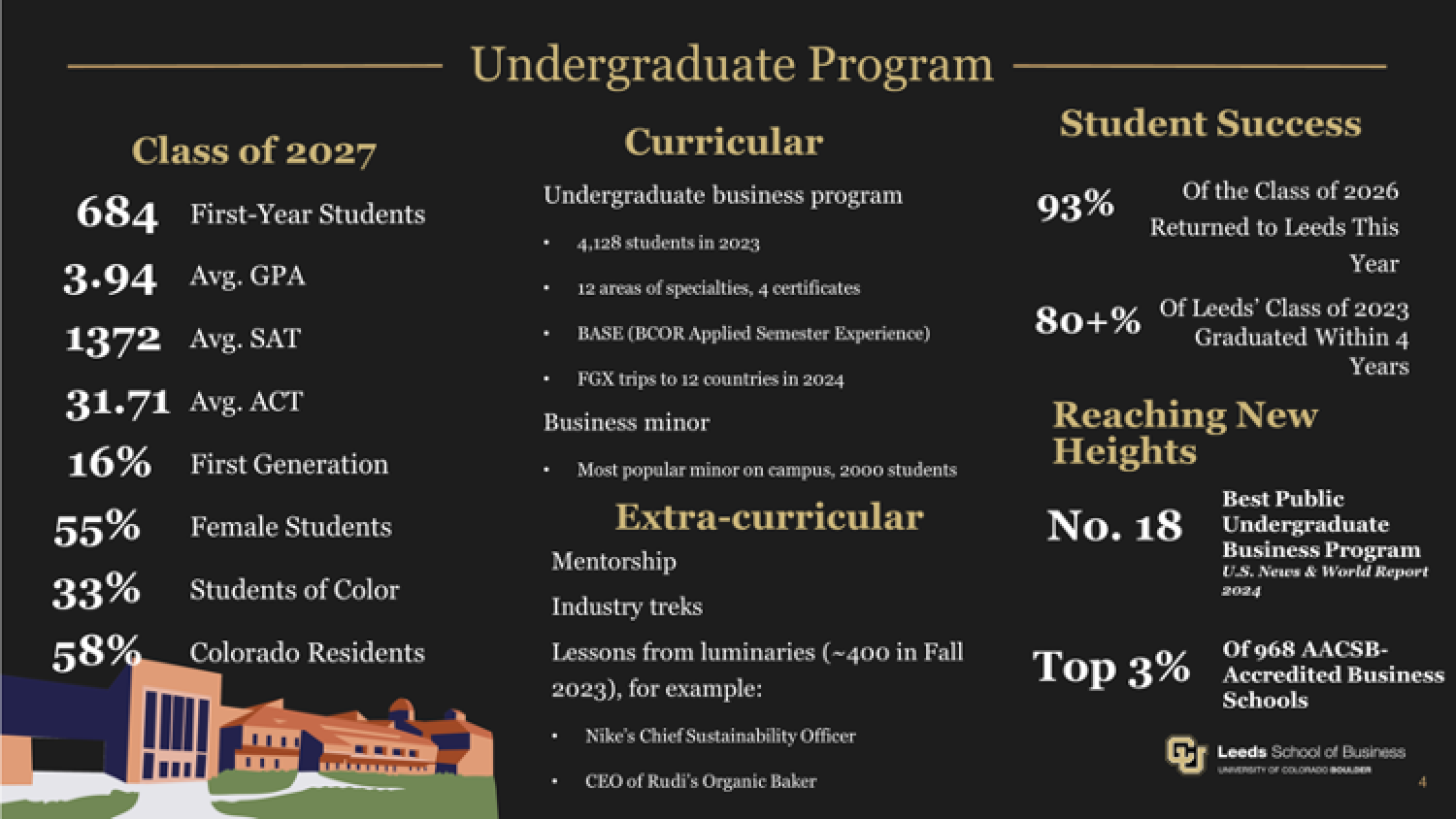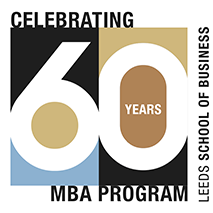Highlights from Dean Khatri's State of the School 2024

On February 19th, Dean Khatri presented the State of the School 2024 to Leeds alumni, parents, and community members. Dean Khatri shared a vision for the school’s future and addressed questions from the audience—including how Leeds is preparing students for a competitive job market, Leeds’ approach to Glocal impact, and how Leeds is incorporating AI into its education.
Below are a few excerpts from the conversation:
Moderator: Tell us about Leeds’ latest admitted undergraduate class, the Class of 2027
Dean Khatri: The class that we admitted in the last fall, this is the most talented class ever. As you can see from the SAT and the ACT scores, their SAT and ACT scores were in the top 94 or 95th percentile, on average. We've got students that are first generation, and for the first time 55% of our students are women.
Moderator: What does experiential learning look like at Leeds?
Dean Khatri: In the undergrad program, we have areas of specialty and certificates that we offer to over 4,000 students. Our base, or BCOR, applied semester experience is known nationwide for actually providing concepts and then providing opportunity for students to intertwine all the different things that they've learned in those different modules, or mods. Students also go on trips all over the world. In spring 2024, they will be going to all places in the world, approximately 12 different countries. We also offer a minor in the undergrad program, which is the largest minor at CU Boulder, and it's taken by over 2,000 students. And we also believe that learning doesn't happen just in the classroom. Learning also happens outside classroom, which means that we need to design ways for students to partake of our mentorship from our alumni and our corporate partners. Our students go out for industry treks, they get lessons from luminaries. Just this last semester, we had close to 400 speakers just in one semester that came to Leeds. They came from all places, like Nike, Rudy's Organic Bakery, and more.
We really are bringing a lot of innovation into our graduate programs as well. We have launched online plus, which provides studio-quality videos for our students and provides them with hybrid experience. Much like the undergrad program, we also have global and experiential opportunities that we provide to our students. For example, our students go to different countries in the world through MBAX; they also get to go on industry tracks and panels. Another thing that is extremely innovative for our students are the innovative pathways. These are focused experiential opportunities for our students who may be interested, for example, in high growth venture, they may be interested in clean energy, they may be interested in a natural and organic pathway. We offer multiple pathways, and more pathways are in the works. Our graduate programs are on the rise. When you look at the MBA program, it's ranked number 32. And when it comes to part time MBA program, we're ranked number 25 amongst public schools.
Moderator: What is the 2035 strategic plan you have envisioned for Leeds?
Dean Khatri: Let me discuss the 2035 emerging areas of impact. For us to develop our strategic vision, we essentially need to undertake two steps. The first step we need to envision Leeds is we need to answer three big questions. The first big question is what would businesses and Colorado look like in the next decade? Based on this, what would business education look like in the next decade? And what would business research look like in the next decade? So those three questions essentially, as you see, are all intertwined. We are in the midst of asking all of those three questions, and we will use answers to those questions as input to develop a strategic plan.
Let’s talk about the four potential areas of impact.
The first one, it shouldn't come as a surprise, is holistic education experiences. We need to showcase how concepts are applied in the real world, which is very experiential. We need to think about holistic education experiences, both in class, as well as experiential and career opportunities.
The second area of impact is providing multifaceted innovation. Education institutions are like any other institution—we really need to be right in the midst of innovation, and we need to provide extraordinary disciplinary innovation. At the same time, we also have to engage in deliberate, interdisciplinary breakthroughs.
The third piece is a workplace, it's Glocal. What it implies is that we need to focus on global engagement—how do we enhance our global footprint worldwide? At the same time, when our students go out and explore the world, they should come back, and they should make a commitment to transform our own neighborhoods. The reason we want our students to explore the whole world is because they should have a commitment to transform our own neighborhoods. So we are engaging in service based learning and civic leadership.
This is our fourth area of impact: communities of care. We are trying to also invite several civic leaders so that our students get a better sense of what it means to be a leader. It's not just corporate leaders, corporate leadership is set in the context of civic leadership. And the communities of care really says that we want to emphasize fostering communities within Leeds. But we also want to connect our communities within these two communities outside of Leeds.
Moderator: How is Leeds incorporating AI into its education?
Dean Khatri: We're trying to figure out how to infuse AI in business education. It's not about offering a course on AI, it really is about, "How do we provide education to our faculty members themselves, so that they can provide that in sessions?" Within the marketing course or within the finance course, for example, we're also trying to look into intertwining physical and digital education experiences. The Gen Z students are digital natives and the way they consume information is not the way I, for example, consumed educational experiences—I was always in the class. So, we're also looking into conducting small experiments. And this is another example of an experiment that we're planning to conduct with the engineering school as to how do we design these physical and digital experiences so that they are intertwined together either through gamification, or by using AR or augmented reality or virtual reality? We are always looking to expand our experiential learning opportunities.
Dean Khatri covers these topics and many more in the full presentation, which can be found here.







